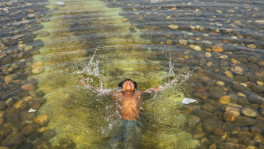Salinity in water takes a toll on women’s health in coastal areas
The lack of fresh water in the coastal areas are forcing families to spend a sizeable amount in purchasing water from local plants set up by the government and NGOs

Padmavati Rani has been married five years and has a three-year-old daughter. She is standing in line to collect water and is having a hard time managing her kid.
Rani looks like she is barely past her teens and yet she is carrying her child and two pitchers of water. A resident of Burigowalini village of Shyamnagar upazila in Satkhira, Rani got married when she was approximately 12 years old.
Her house is seven minutes away from the freshwater source introduced by the Water Development Board in 2016. Rani usually makes two trips here every day.
"I am lucky to live only seven minutes away from the plant. There are sisters who come from faraway places to collect water," said Rani.
Because of the increased salinity, the tube wells in Rani's locality and other coastal areas no longer draw fresh water.
Residents here collect water from the government plant, from nearby ponds and rainwater harvesting. Others purchase water at Tk0.5 per litre from water treatment plants introduced by different NGOs.
Sometimes, they have to spend up to Tk30 for each jar (containing 30 litres of water), an amount not everyone can afford. So, they end up buying water only for drinking and use saline water for other chores.
According to the World Bank, there are 30 million people living in the coastal area of Bangladesh among which 2.5 million are facing an acute crisis of fresh water.
The fresh water crisis that is deeply entwined with global warming and climate change. As a consequence of global warming, the sea level is rising all around the world and the recurrent cyclones related to climate change are causing saline water intrusion into fresh water bodies.
Scientific and Academic Publishing, an open-access publisher of journals, conducted a research in 2014 which revealed that salinity in Bangladeshi water bodies had increased by around 26% in the last 35 years and by 2050, the rate will be much higher than now.
The situation will have a grave impact on everyone. Yet experts have marked the water crisis as a "women's issue", as women primarily shoulder household chores.
At Shyamnagar upazila, the intensity of the crisis is evident. The sight of the Sundarbans from the bank of the River Maloncho and the presence of green belt all around has indeed increased the bucolic beauty of the place.
At the same time, the sight of women queuing up to collect water has also become common. A good number of women work as day labourers or in the shrimp enclosures. But this does not relieve them from the domestic chores, starting from collecting safe water.
Tumpa, a resident of Abad Chandipur, has to wake up before dawn to collect water from a plant two kilometres away from her home. Otherwise, she gets late to work.
The workload has caused her to face health complications like heavy bleeding during menstruation and chronic waist pain. She suffers from palpitation and her exposure to saline water during washing and bathing has caused scabies in her skin.
However, seeing a doctor is a luxury to locals as Shyamnagar Sadar Hospital is not very accessible to all of them. Most of the time, their health issues remain ignored, unnoticed and unresolved.
Dr Rita Rani Paul, a medical officer in Shyamnagar Upazila Health Complex, said skin disease and hypothyroidism caused by a lack of iodine, hypertension, anaemia, menstrual and overall reproductive health complications are common issues among women in the area.
Women here also lack nutrition.
"They are exposed to saline water, but how much iodine they are consuming should be a matter of investigation. They do not get to eat fish or meat. Whenever they get it, they save it for the male members of the family."
In September 2020, Dr Rita participated in a campaign arranged by Bangabandhu Sheikh Mujib Medical University Hospital to give a free check-up for cervical cancer.
She found out that more than 50% of women in coastal areas are suffering from pre-cervical cancer symptoms.
Infections both in the uterus and vagina are common among women in the area.
"Menstrual hygiene plays an important role in this but early marriage being rampant in this area has played a greater part in this case," she said.
Women in the area get married at the age of 12-13. By the age of 18, they have at least one or two kids. These make them susceptible to cervical cancer, according to her.
"Exposure to saline water makes pregnancy complicated, by making mothers prone to pre-eclampsia. On the other hand, displacement of uterus is also prevalent as a result of carrying heavy weights," she said.
The doctor also attributed the superstitious lifestyle and a lack of knowledge for the deterioration of women's health.
Though non-governmental organisations and a few other organisations are trying to raise awareness, Dr Rita said it is hard to reach all of them as some of the areas are way too remote.
"We need a more engaging plan to address the issue of women's reproductive health in this area," she added.


 Keep updated, follow The Business Standard's Google news channel
Keep updated, follow The Business Standard's Google news channel















